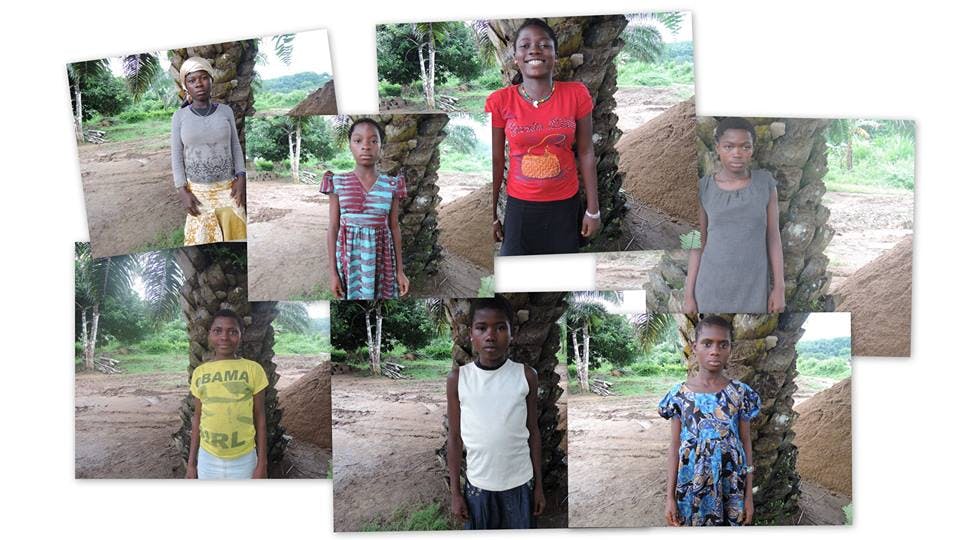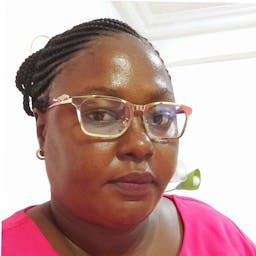JOIN ME TO ENROL MORE GIRLS IN SECONDARY SCHOO; IT PAYS OFF!
May 28, 2019
Story

My Family story
BAI KUKE, CAMEROON - "Mummy, where are we going today," my younger sisters would ask mum. "Are we going to the farm or going to school?"
It had become a routine for four of my younger sisters to ask mum and dad whether they would go to school or go the farm. Iya, the youngest of my four younger sisters recounted that most of the time, they went to the farm instead of school. They were all in primary school. They never believed they would become the high school and university graduates that they all are today.
Life was hard after dad's retirement. For some reasons, he couldn't get his pension, nine years after retirement. He was left with no option than to become a full time farmer so as to support his children's education. While the bigger children, including me, were all in secondary schools in a distant town, my four younger primary school sisters were living with my parents in the village. They were virtually supporting mum and dad to raise money for our schooling from the farm.
Going to school was a miracle. Paying school fees was an even bigger miracle. Getting text books was out of the question, because I never had one. Like a beggar, I would beg textbooks from classmates when ever we were given assignments from there.
It will be interesting to note that I survived the race of education because I was never sent home during fee drive. At least, my parents always paid my fees. But for some others, they weren't lucky. Many of my classmates were constantly sent home during fee drive, on a weekly basis. This made many to drop out of school along the line, become pregnant, got married early, became infected with diseases, faced genderbased violence in their premature matrimonies -- they encountered even worse things.
Reality on the ground in Bai Kuke
In the 1990s in Bai Kuke, a village community where I grew up, going to school was not a priority for girls. The highest girls could go was primary school. Not many even completed primary school. Pregnancy for girls in their early teens was a common eye-saw. Early marriage was another problem. Maternal health and birth complications was a common problem for teenagers. I remember a neighbour's daughter called Mbongi suffered Obstetric fistual during delivery of her first baby; she was only 12 years old in 1997. She died five years later. May her soul rest in perfect peace. I cannot forget how she came to my family house during daily morning prayers with an open water-proof paper in hand, which she will spread on the chair before sitting, so as to avoid soiling the chair with urine. She suffered, not because she wanted to, but because of circumstances surrounding education for girls in that community at the time. She was nicknamed "smelling" by her friends for a condition that she had no control over. Let's leave Mbongi's story for another time.
Background and statistics
According to the 2005 population census in Cameroon, Bai Kuke has a population of 5000 inhabitants. It is located in Mbonge sub division, meme division, of the South West Region of Cameroon. It is a predominantly agricultural community with the main cash crop being cocoa. Men engage in cocoa farming while women concentrate on subsistence farming. The common language spoken in Bai Kuke is pidgin english and english language.
Back in the early 1990s, Bai Kuke had two primary schools and no secondary school. By the close of the 1990s, there was one private secondary school. Today, Bai Kuke has four primary schools and two secondary schools. However, there still exist a gap in boy-girl education.
According to the 2005 census, out of the 3,068,829 children 6-14 years who are going to school, 1,596,222 are boys while 1,472,607 are girls. This shows the big gender gap that exist in education for both genders.
In Bai kuke for example, the preference for boy child education is high. Up to this day, many young girls who are in school and those who have dropped out become pregnant on a daily basis.
What I have done to encourage girl child education
Going to Bai kuke every time and again to visit my parents made me come face to face with the realities of girl child problems in the village. I came to understand why girls dropped out of school. I came to understand how girls lose their lives with early pregnancies and early marriage. I told myself that something can be done to close the education gap that exist between boys and girls.
After my VOF training in 2013, I thought I could make use of the knowledge gained in the training. I wanted to be that change agent that we were trained to become. I wanted to be that solutions-oriented person that world pulse made us. I wanted to remove girls from the households into the classrooms. This thought drove me to what I today call the Rescue Women's Girls Scholarship.
The scholarship scheme is intended to pay school fees for girls only. Taking from my experience, I thought that I succeeded to get education because I always paid fees, and so not having the ill luck of being sent home during fee drive, made me to stay in school constantly as I progressed from one class to another. Sending girls home during fee drive makes some of these girls to go visiting boys in the quarters rather than going straight to the house. We all know that the consequences are enormous.
I made a promise to start saving up a little amount of my monthly salary so as to pay school fees for six girls in the 2014/2015 academic year. Excited about my plans, I shared it on the social media and world pulse, and I didn't believe it when people offered to chip in something to help. You can read my World Pulse articles on that following these linkshttps://www.worldpulse.com/en/community/users/nakinti/posts/34318 https://www.worldpulse.com/en/community/users/nakinti/posts/33438 or just visit my journal https://www.worldpulse.com/en/my-pulse/profile
I ended up raising 310,000frs ($620) from six donors. What is surprising to me is the fact that I was able to make fellow Cameroonians to donate their money for the development of Cameroonian girls. It is no doubt that getting donations from Cameroonians in such a project is hard. People believe that funding can only come from donors from developed countries. I am glad I made strides to change that. All thanks to World Pulse. With the amount I raised, added to what I personally put together from my earnings, I did not only pay fees, I also bought uniforms, books and other accesories. I did not only sponsor 7 girls, I sponsored 7.
I finally went to Bai Kuke and spent the following amount in August 2014:
Tuition + PTA for the girls = 301.000frs
- Uniform + stitching = 48,000frs
- Excercise books = 32, 300frs
- Pens, Pencils, rulers = 9000frs
- Alphabeth/reading classes = 20,000frs
- My to and from Bai Kuke transportation (2 trips) = 50,000frs
- Food + drinks for the launching = 72,000frs
- Hiring of chairs = 4000
- Motivation to Identification Committee = 5000frs
- Dance group = 2000
Total = 543,200frs ($1,087)
Lets do it together
Now, that is what one person did to rescue 7 girls who did not have plans of going to secondary school last academic year. If all of us who have little incomes can send just a girl in need to school in our communities, the school enrolment for girls will increase. Take for example, if one million income earners in Cameroon sponsor one needy girl each, we will have one million girls for one more year and subsequent years in school.
Sad enough for me, last month (april) I went to Bai Kuke to check on how my girls are faring in school and I was shocked to find out that one of the girls is pregnant. On talking to her, I realized she was pregnant one month before she was given scholarship. I cried, not because she was pregnant, but because I was one month late with my support. It is evident that many girls become pregnant if they have no hopes of going to school or if they have no support.
Fellow people, let's not be late in coming in with our support. Together, let's rescue girls before they become drop outs and become pregnant. After all it has been said by several people that "If you educate a boy, you educate an individual, but if you educate a girl, you educate a nation."




